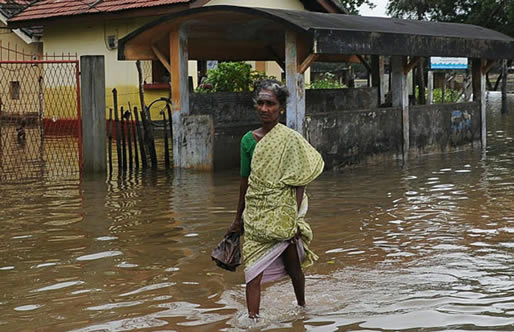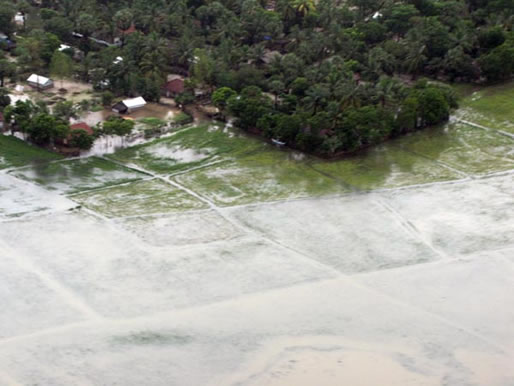
Ilankai Tamil Sangam
Association of Tamils of Sri Lanka in the USA
Published by Sangam.org
by ZOA Refugee Care, February 15, 2011
|
Today, many Sri Lankans in the North and East are contending with the second massive flood of 2011, which began on the fourth of February. The United Nations reports that the first affected over one million and displaced over 350,000. The poorest, most vulnerable families were also most acutely affected by these floods. The first severely compromised most peoples' ability to cope – physically, emotionally and economically – and the second flood threatens to push many back into the so-called "poverty trap." |
COLOMBO, Sri Lanka: 10 February 2011
Ponaya Mutulingam's story is painfully similar to many others' in the North and East of Sri Lanka. He is 41 years old, his wife 39, and they live with their five children in the Eastern District of Batticaloa. Ponaya works as a daily labourer on wealthier farmers' rice paddy lands, and Peranjodi, his wife, runs a small shop. This year they also used their savings, jewelry, to purchase seed and plant one and a half acres of rice paddy. Peranjodi's shop generates an income when there is labour work for the rest of the community, that is, when other families have extra rupees to spend.

Heavy rain started on the ninth of January, and on the 10th, the family was "displaced" to a shared community building, where they stayed with hundreds of other families for five days. Displacement is a term often used to describe the forced movement of vulnerable people, and it tends to reduce people – and their stories – to statistical figures.
This was the Mutulingam's third displacement, as war had chased them from their home twice before. Peranjodi's mud-walled shop is basically destroyed, as is their home. Glass bottles of soda, muddied by the high water, are all that remain in her shop, though no one can afford to buy them now. Over 80% of the paddy fields in the East were destroyed by the floods, which some describe as more extensive and damaging than the 2004 tsunami; and, because rice is a staple food in more than one sense, for hundreds of thousands of Sri Lankans no rice also means no labour and no income. The Mutulingam's have few prospects. In Ponaya's words, "every time we start to earn something again it is destroyed by war or displacement."

Today, many Sri Lankans in the North and East are contending with the second massive flood of 2011, which began on the fourth of February. The United Nations reports that the first affected over one million and displaced over 350,000. The poorest, most vulnerable families were also most acutely affected by these floods. The first severely compromised most peoples' ability to cope – physically, emotionally and economically – and the second flood threatens to push many back into the so-called "poverty trap." There are at least 30% more displacement camps now than after the first flood, over 300,000 acres of paddy harvest are ruined, a similar number of livestock are dead, and tens of thousands of shelters, homes and wells are damaged or destroyed.
Most families had just returned to their homes when the rains began again, and in earnest. Many agencies, including ZOA, had already begun to support the rebuilding process with activities like livelihood assistance, livestock re-stocking, well cleaning, and infrastructure repair. With the second flood come new and often greater emergency needs. To respond, ZOA provides basic food supplies, including dry rations, bread, and biscuits, along with hygienic and other non-food items like mosquito nets, coils, and firewood. ZOA also operates water treatment plants and delivers water by tanker truck where necessary. With vital and immediate funding from the Humanitarian Aid department of the European Commission (ECHO), ZOA continues to support basic needs in a fluid and uncertain working environment. However, the Mutulingams, and countless other families like them, will require support long after the flood waters finally disappear.
Press contact: Jesse Bauman│ZOA Refugee Care│jesse@zoasrilanka.org│+94 077 244 26 27
© 1996-2025 Ilankai Tamil Sangam, USA, Inc.